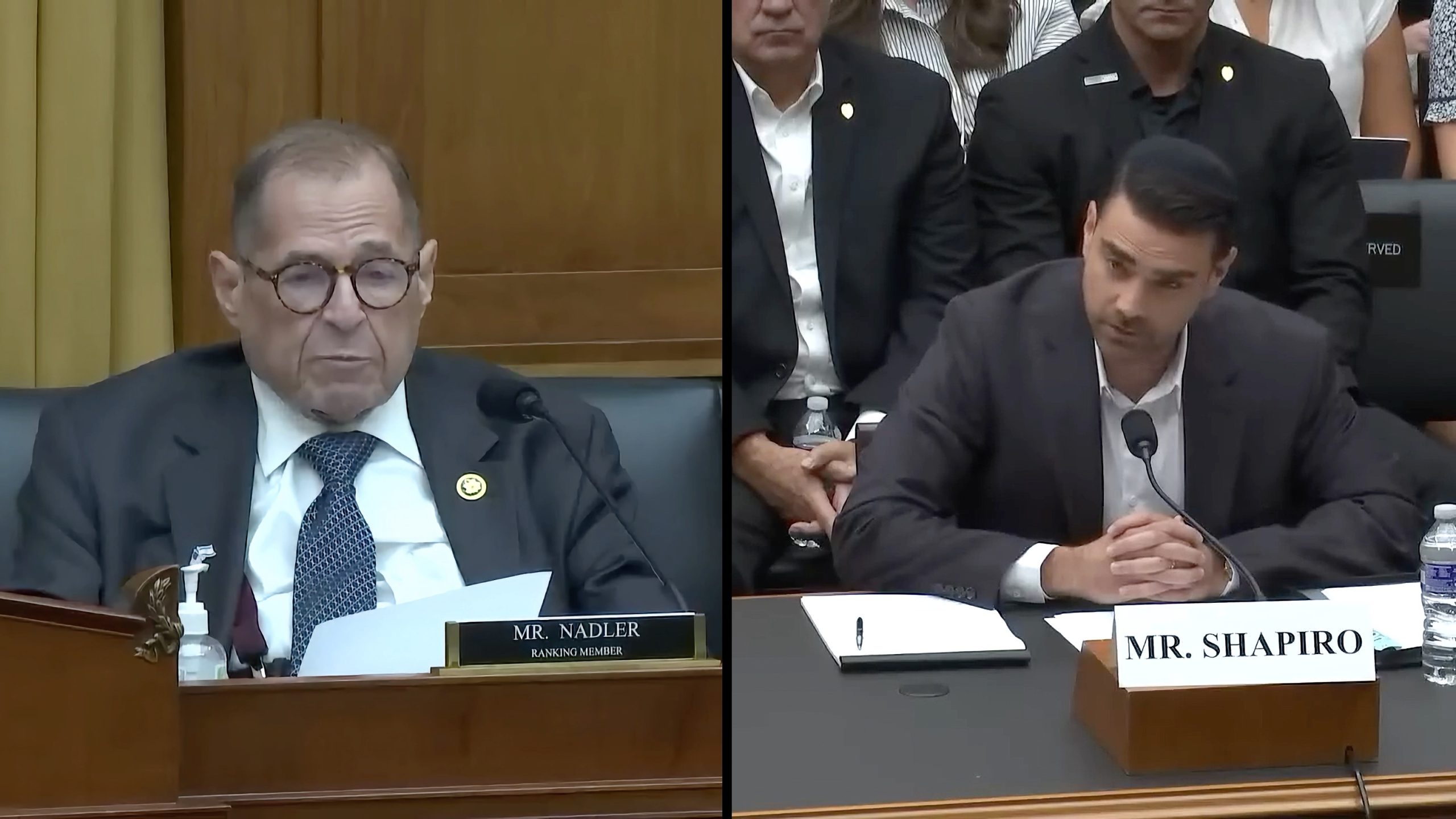During a recent House Judiciary Committee hearing, several Democrats characterized scrutiny of the Global Alliance for Responsible Media (GARM) (a World Economic Forum-affiliated pro-censorship advertising alliance that blacklists brands, creators, and content from advertising if they’re deemed to violate its “brand safety” rules) as “dangerous” and a “sham.”
GARM has faced growing scrutiny over the way its practices have resulted in certain viewpoints being demonetized. Before this July 10 hearing, House Republicans released a report showing that GARM and its members had “carefully” monitored a number of conservative outlets, placed conservative media outlet The Daily Wire on an advertising exclusion list, and pushed for advertising restrictions on the popular “Joe Rogan Experience” podcast.
And the intention of this hearing was to respond to these allegations and examine “whether existing civil and criminal penalties and current antitrust law enforcement efforts are sufficient to deter anticompetitive collusion in online advertising.”
But, as has often been the case during hearings related to huge corporations and alliances targeting smaller businesses and entities, Democrats downplayed, dismissed, or outright denied the concerns that were raised.
“This hearing has nothing to do with antitrust laws, since the majority’s allegations wither under even the most basic antitrust analysis,” Rep. Jerry Nadler (D-NY) said during his opening statement. “This is instead another dangerous effort by the majority to bully companies into promoting and supporting far-right extremist views, views that brands understandably do…not want to be associated with. In this case, the majority seeks to undermine companies’ First Amendment rights and to make it harder for them to avoid monetizing online and offline harm through advertising.”
He continued by suggesting that those who have shone a light on GARM’s practices are engaging in a “made-up scheme” and claimed that there’s “no evidence” to support allegations of wrongdoing.
Later in the hearing, Nadler again dismissed criticism of GARM by describing the investigation into GARM as a “sham.”
Rep. Lucy McBath (D-GA) pushed similar talking points to Nadler and claimed that the issue has been “investigated and produced no support for any unlawfulness.”
Two witnesses who work for companies with close ties to GARM also downplayed this big advertising conglomerate’s role in the blacklisting of independent publishers.
The Global Chief Executive Officer (CEO) of GroupM (a large media buying agency that’s a member of GARM’s Steer Team, which is closely involved in GARM’s day-to-day operations), Christian Juhl, claimed that:
“GroupM is not the arbiter of how to categorize websites, nor do we want to be because we have no control of our publishers and no role in moderating content. We also rely on independent third parties to identify domains with those definitions and additional categories that our clients deem unsuitable.”
Herrish Patel, the President of Unilever USA (a major consumer goods company that’s also part of GARM’s Steer Team), similarly denied that his organization uses market power for censorship or deploys advertising capital in a political way.
And when Rep. Matt Gaetz (R-FL) claimed it’s “hard to believe” Unilever’s goal is to avoid politics when one of its executives flagged a 2020 Trump campaign ad to Facebook to check whether it violated any rules, Patel insisted that he wasn’t sure on the “intention” of the communication and suggested that the push for scrutiny of the ad came from Rob Rakowitz, the leader and co-founder of GARM.
While Democrats and the executives who testified attempted to minimize the impact of GARM’s decisions on smaller brands and publishers, Ben Shapiro, co-founder of The Daily Wire, provided a first-hand account of how Democrats, the Biden administration, Big Tech, legacy media, and entities such as GARM are part of an “informal pressure system” that strips smaller brands and publishers of advertising revenue:
“There is in fact an informal pressure system created by Democratic legislators, this White House, legacy media advertisers, and pseudo-objective brand safety organizations. That system guarantees that advertising dollars flow only to left-wing media brands. Let me explain how this works. When a conservative competitor to the legacy media arises, members of that legacy media and their political allies rush to paint such competitors as dangerous.
The commentator Kara Swisher of the New York Times, for example, told the head of YouTube that my videos at Daily Wire were a quote gateway drug that would lead children, including her own teenage son, to watch neo-Nazi content. Never mind the Yamaka.
Elected Democrats pick up that same messaging in 2017. Senator Diane Feinstein told lawyers at Facebook, Google, and Twitter quote ‘you created these platforms, and now they’re being misused, and you have to be the ones to do something about it or we will.’
Social media companies react to incentive structures, including threats. They’ve responded by adopting the standards of third-party, left-wing informational safety groups like the Global Alliance for Responsible Media or GARM. GARM purportedly sets brand safety standards, objective standards by which advertisers and platforms can supposedly determine just what sort of content ought to be deemed safe for advertising.
In reality, GARM acts as a cartel. Its members account for 90% of ad spending in the United States, almost a trillion dollars. In other words, if you’re not getting ad dollars from GARM members, it’s nearly impossible to run an ad-based business. And if you’re not following their preferred political narratives, the ones that Kara Swisher and Diane Feinstein would follow, you will not be deemed brand-safe. Your business will be throttled.”
Shapiro continued by noting that The Daily Wire’s YouTube channel had seen a “1,000% increase in content enforcements over a 2-year period since 2021” after the Feinstein threat and that his personal Facebook page had seen an “over 80% drop in impressions” after Democrat officials pressured social media companies.
And despite the attempts by Democrats and the GroupM and Unilever executives to present this pressure system as a non-issue, several other exchanges during the hearing further highlighted the uneven way that these advertising blacklists are deployed.
When questioned b y Rep. Russell Fry (R-SC), GroupM executive Juhl was unable to name a single liberal site that has been placed on GroupM’s “risky list.”
Shapiro similarly noted that Unilever is willing to advertise with large legacy media outlets yet is reluctant to advertise on conservative news outlets:
“When it comes to the original question that the chairman was asking, which is whether, for example, Unilever ever advertises…with the New York Times or with MSNBC or with CNN or with The View, all of which have host who have said extraordinarily controversial things, the answer was yes. And when it comes to would they advertise or have they advertised on conservative news outlets, the answer typically is no.
I also should mention at this point that I’ve been told…by the advertising department of my own company that Group M’s managing director actually told us explicitly, The Daily Wire has an uphill battle based on our politically conservative content.”
You can watch the full hearing here.








